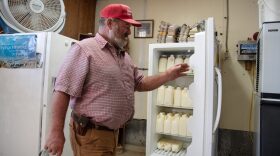-
The discount grocery chain Aldi is expanding rapidly and plans to open more than 180 U.S. stores this year as more Americans skip nights out at restaurants and cook at home due to anxiety over the nation's economy. The chain, with U.S. operations based outside of the Chicago, went on an expansion tear soon after inflation began to spike in 2021 and opened a record number of new stores last year.
-
For the first time, Gaylord Rockies pastry chefs made a giant house decorated entirely with gingerbread. It uses more than 2,000 pounds of sugar, molasses and dough.
-
What’s the most effective diet plan for people who want to lose weight? A new study by a University of Colorado scientist may have answered that: It found that people who fasted three days per week lost more weight than people who simply cut calories across the board.
-
Most kids who are eligible for the program are automatically enrolled, but there are an estimated 67,000 who are not and missed meals last summer. Listen to "Morning Edition" host Michael Lyle, Jr. discuss this story with Colorado Sun reporter Jennifer Brown and then read The Colorado Sun story at the link below.
-
If you’re looking to shrink your carbon footprint, your best strategy may be to start by adjusting your grocery list. That’s the message in a new book by a Fort Collins scientist who studies the link between climate change and the food we eat. Author Mark Easter shares his best tips today on ITN.
-
The high altitude in Colorado can be a challenge for holiday baking. With small recipe adaptations, though, some expert bakers believe any recipe can be accomplished.
-
Colorado has some of the strictest laws against "raw milk" in the west. KUNC's Dylan Simard sat down with reporter Jennifer Brown from Colorado Sun to discuss raw milk and the food freedom movement.
-
Minnesota, New Mexico, Colorado, Vermont, Michigan, and Massachusetts will make school breakfasts and lunches permanently free to all students starting this academic year, regardless of family income.
-
Restaurant prices in Colorado are increasing faster than anywhere else in the country, and it's hurting both restaurants and customers.
-
A new study reveals eliminating food waste would reduce carbon emissions. But many of those gains in reduced emissions would be wiped out by subsequent changes in consumer behavior.

Play Live Radio
Next Up:
0:00
0:00
Available On Air Stations










